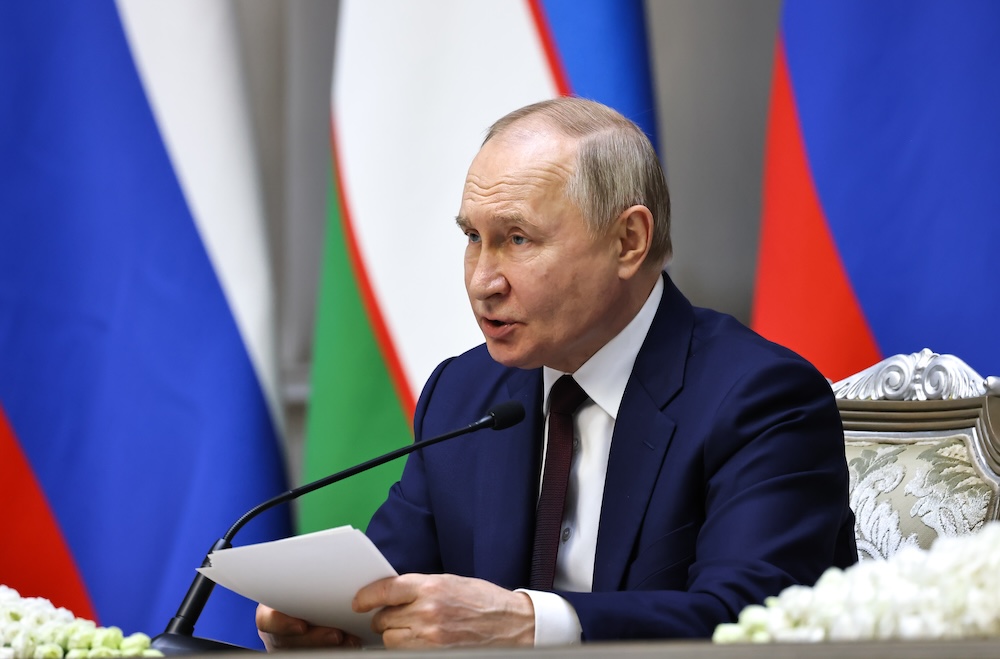Politics
JUST IN: Russia Makes Major Move Signaling Escalation After US Missiles Are Fired From Ukraine

In a move signaling a significant escalation in the ongoing conflict with Ukraine, Russian President Vladimir V. Putin has approved updates to the country’s nuclear doctrine, lowering the threshold for the use of nuclear weapons. The decree, signed on Tuesday—the 1,000th day of the war—introduces new conditions under which Russia would consider deploying its arsenal, including attacks by non-nuclear states if backed by nuclear powers.
This follows the controversial decision by the Biden administration on Monday to permit Ukraine to use U.S.-supplied long-range missiles for strikes inside Russian territory. Ukrainian forces reportedly began employing these weapons in targeted assaults earlier this week, deepening tensions between Washington and Moscow.
The use of long-range missiles by Kyiv represents a new phase in the conflict, enabling strikes deep within Russian territory—a capability previously avoided by Ukrainian forces due to concerns over escalating the war.
Under the revised policy, Russia has broadened the scenarios that could trigger a nuclear response, state-run news agency Tass reported. A significant strike using conventional missiles, drones, or aircraft against Russia—or even Belarus—could now qualify as grounds for nuclear retaliation.
Any attack on Russia by a member of a coalition would be treated as aggression by the entire alliance. The changes extend the range of potential threats and expand the list of countries and coalitions that could provoke a nuclear response, signaling a more assertive stance on national security.
The Kremlin’s new doctrine now includes strikes against nuclear-armed nations aiding nonnuclear countries, clearly targeting Ukraine’s U.S.-led backers. Additionally, it lowers the bar for nuclear retaliation, shifting from threats to Russia’s existence to “critical threats” to its sovereignty
Putin has previously raised the specter of nuclear weapons, a move Ukraine has condemned as “nuclear sabre-rattling” aimed at discouraging its allies from offering more support. However, Russian Foreign Minister Sergey Lavrov stated, “we strongly are in favor of doing everything to not allow nuclear war to happen,” according to BBC.
During a press conference at the G20 summit in Rio de Janeiro, Lavrov highlighted a declaration signed by the group, including Russia, saying it “clearly said we want to move towards a world free of nuclear weapons.”
The White House dismissed concerns over Putin’s updated doctrine, emphasizing stability in Russia’s nuclear strategy. A National Security Council spokesperson said there has been “no indication of any shift in Russia’s nuclear posture,” downplaying the significance of the announcement.
For Kyiv, the use of long-range missiles marks a new opportunity to strike at Russia’s logistical hubs and supply lines, potentially shifting the dynamics of the battlefield. For Moscow, the response has been to double down, using both military force and policy changes to raise the stakes.
The conflict, which began with Russia’s invasion of Ukraine in February 2022, has evolved into a grinding war of attrition. Both sides have suffered heavy losses, with no clear end in sight.
In September, Putin claimed that deeper missile strikes into Russia by Ukraine would escalate into a direct conflict with NATO. Before Biden’s decision, U.S. officials were divided—some feared retaliation from Russia, while others dismissed the risk as overstated. After the announcement, Russian officials escalated their rhetoric, issuing stark warnings about the increased danger of nuclear war.
Whether the Biden administration’s gamble on long-range missiles will pay off—or lead to further peril—remains uncertain. As the war enters its 1,001st day, the world watches anxiously.
(FREE REPORT: Take Advantage Of Trump’s New “IRS Loophole” ASAP)

